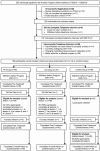A RCT of a transdiagnostic internet-delivered treatment for three anxiety disorders: examination of support roles and disorder-specific outcomes
- PMID: 22132216
- PMCID: PMC3223218
- DOI: 10.1371/journal.pone.0028079
A RCT of a transdiagnostic internet-delivered treatment for three anxiety disorders: examination of support roles and disorder-specific outcomes
Abstract
Background: Anxiety disorders share common vulnerabilities and symptoms. Disorder-specific treatment is efficacious, but few access evidence-based care. Administering transdiagnostic cognitive-behavioral therapy via the internet (iCBT) may increase access to evidence-based treatment, with a recent randomized controlled trial (RCT) providing preliminary support for this approach. This study extends those findings and aims to answer three questions: Is a transdiagnostic iCBT program for anxiety disorders efficacious and acceptable? Does it result in change for specific disorders? Can good clinical outcomes be obtained when guidance is provided via a Coach rather than a Clinician?
Method: RCT (N = 131) comparing three groups: Clinician-supported (CL) vs. Coach-supported (CO) vs. waitlist control (Control). Individuals met DSM-IV criteria for a principal diagnosis of generalized anxiety disorder (GAD), social phobia (SP) or panic disorder with or without agoraphobia (Pan/Ag). Treatment consisted of an 8-lesson/10 week iCBT program with weekly contact from a Clinician or Coach, and follow-up at 3-months post-treatment.
Results: Outcomes for the pooled treatment groups (CL+CO) were superior to the Control group on measures of anxiety, depression and disability, were associated with medium to large effect sizes (Cohen's d = .76-1.44) (response rate = 89-100%), and were maintained at follow-up. Significant reductions were found on disorder-specific outcomes for each of the target diagnoses, and were associated with large effect sizes. CO participants achieved similar outcomes to CL participants at post-treatment, yet had significantly lower symptom severity scores on general anxiety, panic-disorder, depression and disability at follow-up (d = .45-.46). Seventy-four percent of CO and 76% of CL participants completed the program. Less than 70 minutes of Clinician or Coach time was required per participant during the program.
Discussion: This transdiagnostic iCBT course for anxiety appears to be efficacious, associated with significant change for three target disorders, and is efficacious when guided by either a Clinician or Coach.
Trial registration: Australian New Zealand Clinical Trials Registry ACTRN12610000242022.
Conflict of interest statement
Figures
References
-
- Goldberg D, Krueger R, Andrews G, Hobbs M. Emotional disorders: Cluster 4 of the proposed meta-structure for DSM-V and ICD-11. Psychological Medicine. 2009;39:2043–2059. - PubMed
-
- Andrews G, Creamer M, Crino R, Hunt C, Lampe L, et al. Cambridge: Cambridge University Press; 2003. The treatment of anxiety disorders: clinicians guides and patient manuals.
-
- Burgess P, Pirkis J, Slade T, Johnston A, Meadows G, et al. Service use for mental health problems: Findings from the 2007 National Survey of Mental Health and Wellbeing. Australian and New Zealand Journal of Psychiatry. 2009;43:615–623. - PubMed
-
- Richards D, Suckling R. Improving access to psychological therapies: Phase IV prospective cohort study. British Journal of Clinical Psychology. 2009;48:377–396. - PubMed
-
- Bennet-Levy J, Richards D, Farrand P. Oxford: Oxford University Press; 2010. Low intensity CBT interventions: a revolution in mental health care; Bennet-Levy J, Richards DA, Farrand P, Christensen H, KM G, et al., editors. pp. 3–18.
Publication types
MeSH terms
LinkOut - more resources
Full Text Sources
Medical
Miscellaneous


